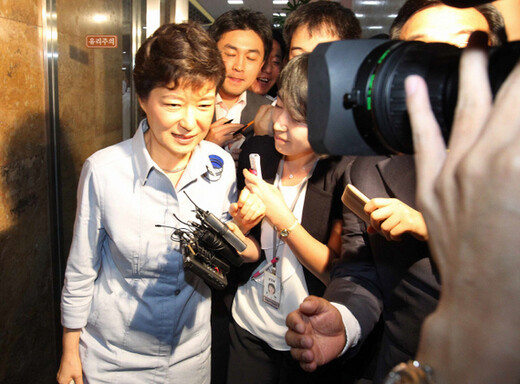hankyoreh
Links to other country sites 다른 나라 사이트 링크
Park Geun-hye outlines more balanced N.Korea policy in Foreign Affairs

By Seong Yeon-cheol
Former Grand National Party (GNP) Chairwoman Park Geun-hye outlined a new North Korea policy of “trustpolitik” and an “alignment policy” on Tuesday. In introducing the policy, Park remarked on the need to realize new developments in North Korean policy, saying policymakers in Asia and the international community must “adopt a bolder and more creative approach.”
Park’s contribution, titled “A New Kind of Korea,” was published Tuesday in the U.S. foreign policy bimonthly journal Foreign Affairs. In the article, Park offers balanced policy as a strategy for bringing trust-based diplomacy into inter-Korean relations
“What little confidence did exist between the two countries virtually disappeared last year, after North Korea destroyed the South Korean naval ship Cheonan in March and brazenly attacked Yeonpyeong Island in November,” Park wrote.
Park also commented on the need for trust-based diplomacy.
“In order to transform the Korean Peninsula from a zone of conflict into a zone of trust, South Korea should adopt a policy of ‘trustpolitik,’ establishing mutually binding expectations based on global norms.”
In addition, Park remarked that neither those who have continually supported North Korea nor those who have continually emphasized pressure have succeeded in effecting meaningful changes in the country.
“A new policy is needed: an alignment policy, which should be buttressed by political consensus and remain constant in the face of political transitions and unexpected domestic or international events,” she said.
“An alignment policy would entail assuming a tough line against North Korea sometimes and a flexible policy open to negotiations other times.”
“To implement such an alignment policy, South Korea must first demonstrate, through a robust and credible deterrent posture, that it will no longer tolerate North Korea’s increasingly violent provocations. It must show Pyongyang that the North will pay a heavy price for its nuclear threats.”
At the same time, Park says Seoul and its allies “must also be prepared to offer Pyongyang a new beginning. Trust can be built on incremental gains, such as joint projects for enhanced economic cooperation, humanitarian assistance from the South to the North, and new trade and investment opportunities.”
When she met North Korean leader Kim Jong-il in 2002, Park they discussed issues “including a Eurasian railway project that would reconnect the Trans-Korean Railway, which has been severed since the Korean War, and link it to the Trans-Siberian and Trans-China lines. Reconnecting the Korean railway would be a testament to mutual development and inter-Korean peace.”
Observers interpreted Park’s contribution as the further development of a speech she delivered in 2009 at Stanford University.
At that time, she said that all the nations involved in inter-Korean issues, including the U.S., China, Russia, and Japan, should work toward a permanent Northeast Asia peace and cooperation body that transcends the framework of one-off talks.
Park’s associates explained that she submitted the contribution to the prestigious foreign affairs journal in the interest of joining forces with the world’s foreign policy makers to consider inter-Korean issues. The article was originally scheduled for publication in late July, but this was delayed by about one month as the journal asked that it focus more on inter-Korean issues in its subject matter, while the situation in the Middle East became the primary subject of coverage.
Experts in inter-Korean relations remarked that Park failed to explain how North Korea and South Korea are to put her conception of balanced policy into practice.
Inje University Professor Kim Yeon-chul said, “I do not see any positive ideas from South Korea on how to build trust and peace.”
Kim added, “The Lee Myung-bak administration has shown that you are unlikely to change a situation of tension and hostility simply by saying you will respond to North Korea’s approach.”
Please direct questions or comments to [englishhani@hani.co.kr]
Editorial・opinion
![[Editorial] Does Yoon think the Korean public is wrong? [Editorial] Does Yoon think the Korean public is wrong?](https://flexible.img.hani.co.kr/flexible/normal/500/300/imgdb/original/2024/0417/8517133419684774.jpg) [Editorial] Does Yoon think the Korean public is wrong?
[Editorial] Does Yoon think the Korean public is wrong?![[Editorial] As it bolsters its alliance with US, Japan must be accountable for past [Editorial] As it bolsters its alliance with US, Japan must be accountable for past](https://flexible.img.hani.co.kr/flexible/normal/500/300/imgdb/original/2024/0417/6817133413968321.jpg) [Editorial] As it bolsters its alliance with US, Japan must be accountable for past
[Editorial] As it bolsters its alliance with US, Japan must be accountable for past- [Guest essay] Amending the Constitution is Yoon’s key to leaving office in public’s good graces
- [Editorial] 10 years on, lessons of Sewol tragedy must never be forgotten
- [Column] A death blow to Korea’s prosecutor politics
- [Correspondent’s column] The US and the end of Japanese pacifism
- [Guest essay] How Korea turned its trainee doctors into monsters
- [Guest essay] As someone who helped forge Seoul-Moscow ties, their status today troubles me
- [Editorial] Koreans sent a loud and clear message to Yoon
- [Column] In Korea’s midterm elections, it’s time for accountability
Most viewed articles
- 1[Column] The clock is ticking for Korea’s first lady
- 2Samsung barricades office as unionized workers strike for better conditions
- 3[Editorial] When the choice is kids or career, Korea will never overcome birth rate woes
- 4Why Israel isn’t hitting Iran with immediate retaliation
- 5[News analysis] After elections, prosecutorial reform will likely make legislative agenda
- 6[Editorial] Does Yoon think the Korean public is wrong?
- 7S. Korea, Japan reaffirm commitment to strengthening trilateral ties with US
- 8[Editorial] As it bolsters its alliance with US, Japan must be accountable for past
- 9Japan officially says compensation of Korean forced laborers isn’t its responsibility
- 10Faith in the power of memory: Why these teens carry yellow ribbons for Sewol